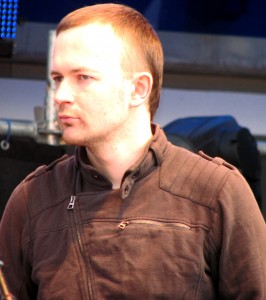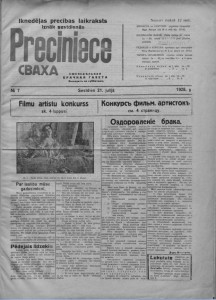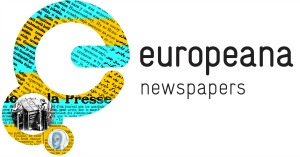Within the Europeana Newspapers project, we often speak of the value of historic newspapers for the academic community but how exactly might a researcher use the material that we’re gathering?

This month we’re interviewing Kārlis Vērdiņš, a researcher at the Institute of Literature, Folklore and Art at the University of Latvia. He has written a formidable monograph about free verse in poetry (“The Bastard Form”, 2011) and also is a renowned Latvian poet and translator.
What is your area of research?
The main field of my research is the history of Latvian literature. I am interested also in queer theory and gender studies. Currently I’m researching topics of gender and sexuality in Latvia at the turn of 20th century. Together with three of my colleagues we are working on a book about this period. Its working title is Translating Cultures, referring to the fact that during this period Latvian culture was borrowing a lot from other cultures, adopting or translating customs and ideas in its own fashion.
I know that your current research also involves periodicals.
Yes, in my recent work the possibilities to use digitised periodicals from the National Library of Latvia (www.periodika.lv) were crucial. This resource makes working with periodicals of late 19th century and the first half of 20th century much more productive. First of all, digitised newspapers are easier to access, it can be done from my home computer. I have spent many late nights in the periodical’s portal, and there are entirely new possibilities to explore usage of various terms. Due to the wear and tear of the originals, sometimes the digitised material is not perfect, but it is still useful. The texts are easy transformable into digital format, a Word document etc. And the use of keywords make easy to work with it.

What is special about periodicals, why are they particularly interesting?
Sometimes we imagine that the topics and problems we encounter today are entirely new. Newspapers and magazines prove that it is not quite so. This is very much the case also with the sexuality and homosexuality in particular. The topic of homosexuality is virtually non-existent in Latvian books of the late 19th and early 20th century but it surfaces in newspapers.

What did you find?
I’ve found many interesting facts and publications concerning the history of homosexuals in Latvia. For example, there was a Latvian actor Roberts Tautmīlis Bērziņš who was constantly mocked for his femininity in the performance reviews and gossip columns. However, there was one performance where his acting was widely praised – when he impersonated a student who for the sake of a prank pretends to be the rich aunt from Brasil.
Another exciting discovery was finding the only pro-gay newspaper in the 1920s – a humble and shortlived bilingual edition of marriage ads and short love stories. Preciniece/Svaha (The Matchmaker) published, in its last issues, articles on gay themes by an unknown Russian author with a penname Siluet. For sure, I wouldn’t come across this information if I were only looking through physical newspapers, the search possibilities in digitised material were crucial.
What are the main problems when working with digitised material?
The problem is that the resources are not complete yet. At times there has been a confusion regarding older and newer versions of the resources – some editions appeared in one version and seemed lost in another, and so on. Also you cannot obtain a complete picture of the epoch if, for example, the exile publications are very thoroughly represented while some of the most important local titles are still absent. On the other hand, the collections of newspapers have already been successful in merging sets of periodicals which are partially incomplete in several libraries. The problem of incompleteness is probably less acute in a small country like Latvia. In the long term, it will be easier for us to digitise virtually everything, even the materials of comparatively secondary importance (I certainly would like to see it happen), while large cultures probably will never digitise some of less important material which potentially contains information that is useful for Latvian researchers.
What is your experience with digitised collections of other countries?
I have been trying to find some information about Latvian actor Viļums Vēveris who was living and performing in Cologne (Köln) for two years. I couldn’t find much in the German digitised collections unfortunately. I presumed that maybe there is some information in the publications that are not digitised or that I just didn’t know where to look or how to search properly. Therefore, I believe, it is quite important that librarians are able consult extensively also about foreign collections, or that support for the foreign researchers is readily available.
Do you see benefits in creating collaborative aggregated resources, like Europeana Newspapers?
Yes, they could be very helpful. It could make comparative studies on various subjects much easier.
In your opinion, to what extent digitisation may change the humanities? Are there new topics, new requirements for research?
Naturally, there will be changes. We can work with much more material. It can be seen very clearly now at what point a new term appears in the language and culture, data can be made into diagrams, if needed. The way we see the task of the researcher changes. What is a true researcher? We used to see him as somebody who has rifled through every publication and has spent most of the days of his life in the library, turning dusty pages of newspapers.
Interview by Anda Baklāne, National Library of Latvia, April 2014
